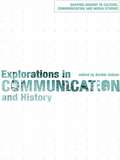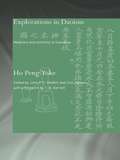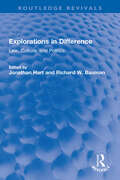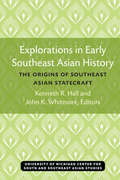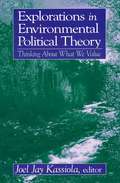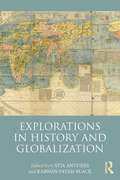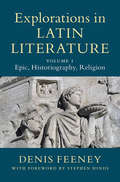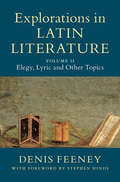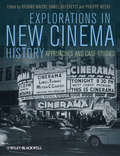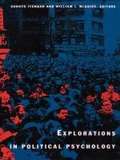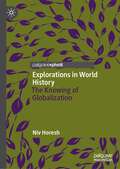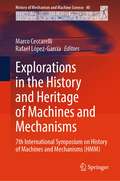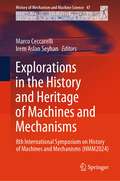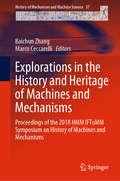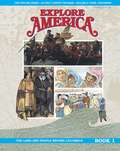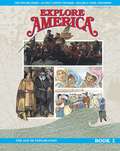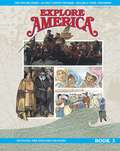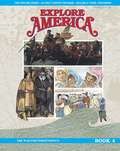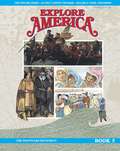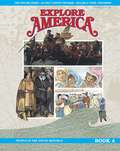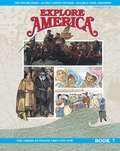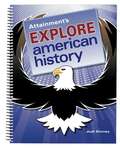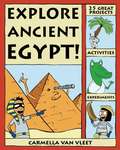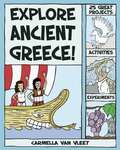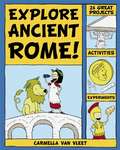- Table View
- List View
Explorations in Communication and History (Shaping Inquiry in Culture, Communication and Media Studies)
by Barbie ZelizerWhen and how do communication and history impact each other? How do disciplinary perspectives affect what we know? Explorations in Communication and History addresses the link between what we know and how we know it by tracking the intersection of communication and history. Asking how each discipline has enhanced and hindered our understanding of the other, the book considers what happens to what we know when disciplines engage. Through a critical collection of essays written by top scholars in the field, the book addresses the engagement of communication and history as it applies to the study of technology, audiences and journalism. A comprehensive introduction by Barbie Zelizer contextualises these debates and makes a case for the importance of disciplinary engagement for teaching as well as research in media and cultural studies and each section has a brief introduction to contextualise the essays and highlight the issues they raise, making this an invaluable collection for students and scholars alike.
Explorations in Daoism: Medicine and Alchemy in Literature (Needham Research Institute Series)
by Ho Peng YokeThe Daoist canon is the definitive fifteenth century compilation of texts concerning ritual, alchemical and meditation practices within Daoist religion. Many of these texts are undated and anonymous, so dating them is essential for a clear understanding of the development of Chinese alchemy, and the place of these texts in history. Ho Peng Yoke's Explorations in Daoism brings together an extraordinary compendium of data on alchemical knowledge in China, describing the methods used for dating important alchemical texts in the Daoist canon, and reconstructing and translating a number of alchemical texts that exist only in fragments scattered throughout the Daoist canon, pharmacopoeia and other compendia. This book provides a clear guide for students and scholars about the methods required for dating and reconstituting texts using techniques that can be applied to other areas of traditional Chinese culture also. As such, this book will appeal to those interested in Chinese alchemy, the history of science, Daoism and Chinese history.
Explorations in Difference: Law, Culture, and Politics (Routledge Revivals)
by Jonathan Hart Richard W. BaumanFirst published in 1996, Explorations in Difference explores how contemporary debates over identity and difference come into play within the workings of cultural, legal, and political institutions. The book brings together a variety of perspectives on the meanings and implications of difference in the context of postmodern theory. It is divided into two parts: ‘Theoretical Accounts’, which establishes a context for postmodern inquiries into difference, and ‘Instances’, which provides application to particular issues. Highly interdisciplinary, Explorations in Difference continues to have lasting relevance and will appeal to those with an interest in postmodern difference and its implications.
Explorations in Early Southeast Asian History: The Origins of Southeast Asian Statecraft (Michigan Papers On South And Southeast Asia #11)
by Kenneth R. Hall John K. WhitmoreWhile following the probes of foreign individuals into various obscure parts of Southeast Asia over the centuries is a diverting and entertaining pastime, the purpose of this volume is to investigate this past with the mind, to question and postulate upon the historical patterns that have developed from earlier study of the area, and to bring concepts from other areas and disciplines to bear on the existing information. The product of this effort, as it is encompassed in this volume, is not an attempt at the definitive study of any of the topics. It is rather a series of speculations on the directions feasible for the further study of the Southeast Asian past. As such, the answers proposed in these essays are really questions. Are the ideas presented here true within the specific historical contexts for which they have been developed? If so, can we use these ideas, or variations of them, to interpret the history of other parts of Southeast Asia? If not, what other ideas may be brought to bear on these situations in order to understand them? The ultimate aim of this volume is thus a challenge to the profession at large not only to criticize what we have done, but also to go beyond our postulations and create new ones. [xi]
Explorations in Environmental Political Theory: Thinking About What We Value
by Joel Jay KassiolaThe contributors to this volume focus on the political and value issues that, in their shared view, underlie the global environmental crisis facing us today. They argue that only by transforming our dominant values, social institutions and way of living can we avoid ecological disaster.
Explorations in History and Globalization
by Cátia Antunes and Karwan Fatah-BlackConsidering the ways in which the ‘global turn’ is changing the theory and practice of historical disciplines, Explorations in History and Globalization engages with the concept and methodology of globalization, challenging traditional divisions of space and time to offer a range of perspectives on how globalization has affected social, economic, political and cultural history. Each chapter covers a specific theme, discussing how globalization has shaped these themes and how they have contributed to globalization throughout history. Including topics such as ecological exchanges, trade, exchanges of knowledge, migration, empire and urbanization, this volume both explains historical trajectories through a global analytical framework and provides tools that students can employ when posing their own research questions about historical globalization. Containing suggestions for further reading and guidance on the ways in which primary source material can be used as a basis for global historical studies, this is the ideal volume for all students interested in the global exchanges between people throughout history.
Explorations in Latin Literature: Volume 1, Epic, Historiography, Religion
by Denis FeeneyDenis Feeney is one of the most distinguished scholars of Latin literature and Roman culture in the world of the last half-century. These two volumes conveniently collect and present afresh all his major papers, covering a wide range of topics and interests. Ancient epic is a major focus, followed by Latin lyric, historiography and elegy. Ancient literary criticism and the technology of the book are recurrent themes. Many papers address the problems of literary responses to religion and ritual, with an interdisciplinary methodology drawing on comparative anthropology and religion. The transition from Republic to Empire and the emergence of the Augustan principate form the background to the majority of the papers, and the question of how literary texts are to be read in historical context is addressed throughout. All quotations from ancient and modern languages have now been translated and Stephen Hinds has contributed a foreword.
Explorations in Latin Literature: Volume 2, Elegy, Lyric and Other Topics
by Denis FeeneyDenis Feeney is one of the most distinguished scholars of Latin literature and Roman culture in the world of the last half-century. These two volumes conveniently collect and present afresh all his major papers, covering a wide range of topics and interests. Ancient epic is a major focus, followed by Latin lyric, historiography and elegy. Ancient literary criticism and the technology of the book are recurrent themes. Many papers address the problems of literary responses to religion and ritual, with an interdisciplinary methodology drawing on comparative anthropology and religion. The transition from Republic to Empire and the emergence of the Augustan principate form the background to the majority of the papers, and the question of how literary texts are to be read in historical context is addressed throughout. All quotations from ancient and modern languages have now been translated and Stephen Hinds has contributed a foreword.
Explorations in New Cinema History: Approaches and Case Studies
by Philippe Meers Daniel Biltereyst Richard MaltbyExplorations in New Cinema History brings together cutting-edge research by the leading scholars in the field to identify new approaches to writing and understanding the social and cultural history of cinema, focusing on cinema’s audiences, the experience of cinema, and the cinema as a site of social and cultural exchange. Includes contributions from Robert Allen, Annette Kuhn, John Sedwick, Mark Jancovich, Peter Sanfield, and Kathryn Fuller-Seeley among others Develops the original argument that the social history of cinema-going and of the experience of cinema should take precedence over production- and text-based analyses Explores the cinema as a site of social and cultural exchange, including patterns of popularity and taste, the role of individual movie theatres in creating and sustaining their audiences, and the commercial, political and legal aspects of film exhibition and distribution Prompts readers to reassess their understanding of key periods of cinema history, opening up cinema studies to long-overdue conversations with other disciplines in the humanities and social sciences Presents rigorous empirical research, drawing on digital technology and geospatial information systems to provide illuminating insights in to the uses of cinema
Explorations in Political Psychology
by Shanto Iyengar William J. McguireMapping the territory where political science and psychology intersect, Explorations in Political Psychology offers a broad overview of the the field of political psychology--from itshistorical evolution as an area of inquiry to the rich and eclectic array of theories, concepts, and methods that mark it as an emerging discipline. In introductory essays, editors Shanto Iyengar and William J. McGuire identify the points of exchange between the disciplines represented and discuss the issues that make up the subfields of political psychology. Bringing together leading scholars from social psychology and political science, the following sections discuss attitude research (the study of political attitudes and opinions); cognition and information-processing (the relationship between the structures of human information-processing and political and policy preferences); and decision making (how people make decisions about political preferences). As a comprehensive introduction to a growing field of interdisciplinary concern, Explorations in Political Psychology will prove a useful guide for historians, social psychologists, and political scientists with an interest in individual political behavior.Contributors. Stephen Ansolabehere, Donald Granberg, Shanto Iyengar, Robert Jervis, Milton Lodge, Roger D. Masters, William J. McGuire, Victor C. Ottati, Samuel L. Popkin, William M. Runyan, David O. Sears, Patrick Stroh, Denis G. Sullivan, Philip E. Tetlock, Robert S. Wyer, Jr.
Explorations in World History: The Knowing of Globalization
by Niv HoreshThis book provides an analysis of the latest research findings in the field of world history, and includes terse articulations of modernity vis-à-vis empire. In doing so, the author brings together insights from both the disciplines of history and international relations into world systems, emphasising economic aspects, and offering a road map for the evolution of the field of world history.The book achieves this by critically analysing the works of Peter Fibiger Bang, Christopher Alan Bayly, Walter Scheidel, Krishnan Kumar, Xin Fan, Christopher A. Ford and Diego Olstein. The author includes discussions such as how the Roman empire impacted all subsequent Western empires, both early and modern, and current debates in world history and politics such as China’s rise.
Explorations in the History and Heritage of Machines and Mechanisms: 7th International Symposium on History of Machines and Mechanisms (HMM) (History of Mechanism and Machine Science #40)
by Marco Ceccarelli Rafael López-GarcíaThis book gathers the latest advances in the field of history of science and technology, as presented by leading international researchers at the 7th International Symposium on History of Machines and Mechanisms (HMM), held in Granada and Jaén, Spain on April 28-30, 2022. The Symposium, which was promoted by the permanent commission for the History of Machine and Mechanism Science (MMS) of IFToMM, provided an international forum to present and discuss historical developments in the field of MMS. The contents cover all aspects of the development of MMS from antiquity until the present era and its historiography: modern reviews of past works, engineers in history and their works, the development of theories, history of the design of machines and mechanisms, historical developments of mechanical design and automation, historical developments of teaching, the history of schools of engineering, the education of engineers. The contributions, which were selected by means of a rigorous international peer-review process, highlight numerous exciting ideas that will spur novel research directions and foster multidisciplinary collaborations.
Explorations in the History and Heritage of Machines and Mechanisms: 8th International Symposium on History of Machines and Mechanisms (HMM2024) (History of Mechanism and Machine Science #47)
by Marco Ceccarelli Irem Aslan SeyhanThis book gathers the latest advances in the field of history of science and technology, as presented by leading international researchers at the 8th International Symposium on History of Machines and Mechanisms (HMM), held in Ankara, Turkey on April 18-20, 2024. The Symposium, which was promoted by the permanent commission for the History of Machine and Mechanism Science (MMS) of IFToMM, provided an international forum to present and discuss historical developments in the field of MMS. The contents cover all aspects of the development of MMS from antiquity until the present era and its historiography: modern reviews of past works, engineers in history and their works, the development of theories, history of the design of machines and mechanisms, historical developments of mechanical design and automation, historical developments of teaching, the history of schools of engineering, the education of engineers. The contributions, which were selected by means of a rigorous international peer-review process, highlight numerous exciting ideas that will spur novel research directions and foster multidisciplinary collaborations.
Explorations in the History and Heritage of Machines and Mechanisms: Proceedings Of The 2018 Hmm Iftomm Symposium On History Of Machines And Mechanisms (History Of Mechanism And Machine Science Ser. #37)
by Marco Ceccarelli Baichun ZhangThis is the proceedings of the 6th International Symposium on History of Machines and Mechanisms that was held in Beijing, China, in September 2018. The Symposium provided an international forum for presenting and discussing historical developments in the field of Machine and Mechanism Science (MMS). Special sections focused on the following topics: . modern reviews of past works · engineers in history, and their works · direct memories of the recent past · the development of theories · the history of the design of machines and mechanisms · development of automation and robots · the development of teaching of MMS · the schools and institutes of mechanical engineering · the heritage of machines and mechanisms
Explore America, Book 1: The Land and People Before Columbus (3rd edition)
by Carin Dewhirst Leila A. LangstonThis history textbook tells the story of the development of the United States from 1607 to the Civil War.
Explore America, Book 2: The Age of Exploration (3rd edition)
by Carin Dewhirst Leila A. LangstonThis history textbook tells the story of the development of the United States from 1607 to the Civil War.
Explore America, Book 3: Settling the English Colonies (3rd edition)
by Carin Dewhirst Leila A. LangstonThe book tells the story of the development of the United States from 1607 to the Civil War.
Explore America, Book 4: The War for Independence (3rd edition)
by Carin Dewhirst Leila A. LangstonThe book tells the story of the development of the United States from 1607 to the Civil War.
Explore America, Book 5: The Westward Movement (3rd edition)
by Carin Dewhirst Leila A. LangstonTells the story of the development of the United States from 1607 to the Civil War.
Explore America, Book 6: People in the Young Republic (3rd edition)
by Carin Dewhirst Leila A. LangstonTells the story of the development of the United States from 1607 to the Civil War.
Explore America, Book 7: The American People Then and Now (3rd edition)
by Carin Dewhirst Leila A. LangstonTells the story of the development of the United States from 1607 to the Civil War.
Explore American History
by Judi KinneyThe Student Book has 9 chronological chapters from Early Years to A New Century. These follow a consistent format: Anticipatory Set, Vocabulary, History Stories, and Quiz. Twenty-five one-page biographies with corresponding comprehension exercises are also aligned to the curriculum's chronology.
Explore Ancient Egypt!
by Carmella Van Vleet Alex KimPyramids, mummies, amulets, temples, and pharaohs- Explore Ancient Egypt! brings this fascinating civilization to young readers ages 6-9 with 25 hands-on projects, activities, and games. Kids learn about ancient Egyptian homes, food, money, toys, games, makeup, clothes, kings, mummies, and more. Projects are easy to follow and require primarily common household products and very little adult supervision.Activities range from making a scarab necklace to writing in ancient Egyptian hieroglyphs and making King Tut sandals. By combining a hands-on element with riddles, jokes, facts, and comic cartoons, kids Explore Ancient Egypt! in this accessible introduction to an incredible, ancient world.
Explore Ancient Greece!
by Carmella Van Vleet Alex KimInvestigate the fascinating civilization of ancient Greece through 25 hands-on projects and activities for young readers ages 6-9. Kids learn about ancient Greek homes, food, playtime, clothing, conquests, arts and entertainment, gods, and more. Activities range from fashioning a model oil lamp from clay to building a courtyard column and constructing a flipbook sailing ship. By combining a hands-on element with riddles, jokes, fun facts, and comic cartoons, kids Explore Ancient Greece! and develop an understanding of how this ancient civilization still influences our modern world.
Explore Ancient Rome!
by Carmella Van Vleet Alex KimInvestigate the fascinating civilization of ancient Rome through 25 hands-on projects and activities for young readers ages 6-9. Kids learn about ancient Roman homes, food, playtime, clothing, conquests, gods, entertainment, and more. Activities range from creating an amphora and making a tunic to baking bread and hosting a Roman feast. By combining a hands-on element with riddles, jokes, fun facts, and comic cartoons, kids Explore Ancient Rome! and develop an understanding of how this ancient civilization laid the foundation of our modern world.
